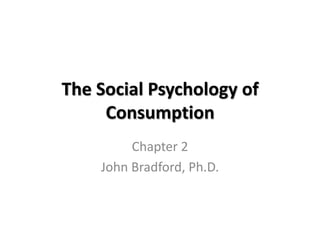
1 29-13 social psychology of consumption
- 1. The Social Psychology of Consumption Chapter 2 John Bradford, Ph.D.
- 2. Consumption and Materialism • “The world has enough for everybody’s need, but not for everybody’s greed”- Gandhi. • Today, aside from the very poor, nearly everyone consumes more than is necessary to survive. Why? – Relates to all three central issues of environmentalism: i) sustainability, ii) environmental justice, iii) beauty of ecology
- 3. Materialism • “The worker can create nothing without nature, without the sensuous external world”- Karl Marx. • Who would disagree with this!?! • All people everywhere have to 1818-1883 produce their means of ‘subsistence’ (livelihood). We all depend on our environments.
- 4. Marx’s Historical Materialism • Human beings form ideas under the influence of material or environmental circumstances. Such ideas then compel them to change circumstances. There is free will, but history is not determined by these freely willed intentions. The point of theory is to predict results, not intentions. • Every society produces a surplus, and has different rules for determining how this surplus wealth is distributed. • Marx says that people’s way of producing a surplus influences (or ‘determines’) their ideas about how to distribute the surplus. Material Ideas Circumstances
- 5. Maslow’s Hierarchy of Needs • Aesthetics • Knowledge & Understanding Self- Actualize Esteem Belonging and Abraham Maslow Love 1908 - 1970 Safety Physiological
- 6. The Original Affluent Society? • Time allocation studies suggest that a typical adult hunter-gatherer only needs to ‘work’ for 2 to 5 hours per day! Uncontacted Tribes, Brazil, 2009
- 7. Uncontacted Tribes Peru 2011
- 8. Before the Industrial Revolution • Difficult to generalize, but based on historical record, we can safely assume the following: 1. There was more leisure and less work 2. There was much less etiquette than today
- 9. Leisure time • Working hours under capitalism (at their peak) increased by more than 50 percent from Medieval period. • Work was intermittent, depended on season: breakfast, lunch, afternoon nap, dinner breaks • General pace was far slower and more leisurely- (based on evidence of caloric intake) • Consciousness of time was radically different: there were no clocks!
- 10. Leisure time • Medieval Europe – In Medieval England, about 1/3rd of the year devoted to leisure – In Medieval France, 52 Sundays off, 90 guaranteed rest days, 38 holidays – In Medieval Spain, 5 months per year were devoted to vacation • Antiquity – Athenians had 50-60 holidays annually – By mid 4th century, Roman calendar designated 175 official public festival days
- 11. Conspicuous Consumption • What is conspicuous consumption? Why do we do it? • We are motivated not only be interests, but also by what Thorstein Veblen Veblen calls ‘sentiments’ 1857 - 1929 – Goods distinguish us from others in a hierarchy, and also show that we belong to one group (and not another)
- 12. The Treadmill of Production • Why are we stuck on this treadmill? Can we get off?
- 13. The Treadmill of Production
Hinweis der Redaktion
- http://www.bbc.co.uk/news/science-environment-16816816
- Source: Juliet Schor, The Overworked American (1992).
